CIOB members took in the magnitude of China’s construction growth at its recent AGM in Shanghai
Day 1: Megalopolis
Delegates still stunned and checking limb function after 24 hours tinned at altitude, via Dubai. “That’s the longest I’ve ever flown economy,” marvels one big wig. Carma Elliot, British Consul-General in Shanghai, delivers a brief orientation. It’s faintly disturbing. We knew China was a big and happening place. But there were things we didn’t know. Like how big and happening.
Apart from Shanghai with its 20 millions, she says, the Yangtze River Delta actually has 20 or so other cities with populations of two million or more, each sending tendrils of road, rail and communications infrastructure out to the others. She doesn’t use the word ‘conurbation’. She uses the word ‘megalopolis’.
The ‘YRD’ megalopolis takes up only a bit of the Chinese land mass but contributes a quarter of its gross domestic product. We can see that. What comes next is a little harder to take in. She says that before the global banking meltdown the region enjoyed 16 straight years of double-digit growth, and for growth to dip into single digits is a blow. Seven or eight percent is necessary just to soak up the nine million Chinese university graduates coming on the market every year, gunning for a slice of Middle Class Pie.
Most delegates, from UK, Australia, Africa, the Americas, Malaysia, Hong Kong and Europe, had done the thing in the hotel room where you push your cheek to the glass to try to see where the high-rise bit stopped.
We’re getting used to Shanghai as a big, fast, cosmopolitan place bristling with wacky skyscrapers, like a congress of super-sized Martians. But that isn’t the half of it. From a development point of view Shanghai is actually the eye of a storm still brewing.
No chance to reflect. Expo time. On the coach over the Lupu bridge we get a birds-eye view of the site, the upside-down-ziggurat-on-posts of the China pavilion, the huge flying saucer of the Cultural Centre and the British pavilion – ‘the Moldy Apple’ its unofficial nickname, according to our guide.
“Better city, better life” is the theme. It’s maybe a bit much to expect the theme to reflect the experience, which is scarcity. Scarcity of space, as you jostle with multitudes to get anywhere or do anything. And scarcity of time. It rings you dry of time. Normal people walk and queue for hours to get on site, into pavilions, into loos, and off site again.
It would be easier to get a feel for the foreign countries on display here by flying to them
We’re VIPs, so we get bigger portions of space and time. We’re ushered straight up to the plush hush of the top floor of the China pavilion, and sit sipping tea on vast sofas, and stroll contemplatively on the veranda looking through the glass floors at the coiling queues of the not-so-important down in the steam bath.
The VIP treatment ends and we’re shunted down and out. Peter Jacobs, CIOB vice president and the man leading the Bovis Lend Lease team on the Athletes’ Village for the 2012 Olympics, is all agog at how Shanghai managed to clear and develop the 5.28 sq km site in about six years.
“I’m stunned,” he says. “The sheer scale of it. The people. It’s on target to attract 70 million in 162 days, 99% of them Chinese.”
“I’d love to know their safety statistics,” he adds later.
We’re gotten the better of by the rain, the queues, and the disorientation of picking our way through what feels like a vast industrial park. It would be easier to get a feel for the foreign countries on display here by flying to them. We disperse to brave the Metro system, which turns out to be quite easy.
Day 2: Nitty gritty
There’s stuff to sort out. First up: say the CIOB were to become a standard-bearer for sustainability, globally. What would that actually look like? Being in Shanghai, amid the fast currents of global development, makes delegates, who represent 43,000 members, one in five of them outside the UK, think big.
Green fatigue falls away. Delegates admit to not knowing where to start, and to confusion both over the basics and over construction’s role in it all. Warnings came from China, Malaysia and Africa that any CIOB policy must acknowledge the challenge is different in different places.
People listen to Bridgette Gasa, CIOB president in Africa, recently called in by South African president Jacob Zuma to help develop a comprehensive development plan for the country. For more than 10 years she’s been speaking internationally on the need to prioritise social infrastructure development over flashy business development (Expo? Olympics?). She says it again. She’s 33.
Suggestions come fast and warm, from offering courses and creating a special CMYA award to the more radical end of the spectrum, such as requiring evidence of carbon awareness (or competence, or leadership, or something) for member accreditation. Alan Crane, battle-scarred from decades pushing industry reform, and due to be CIOB president in 2013, gets the nod to create a special low-carbon working group.
Day 3: Guangxi and Prescott
It’s the CIOB’s Global Construction Summit today. To get anything done in China you need guangxi, the Chinese term for ‘networks and deep friendships’, and the CIOB has it in China.
Back in 1992 it had one member in the People’s Republic and one fax number for the Ministry of Construction. Since then its influence has spread like wildfire among the top echelons and China is the highest membership growth area. Why? Because it pressed special buttons for the Chinese.
John Prescott makes everybody nervous for his future visa prospects
It’s a 175-year-old institute conferring an internationally recognised qualification the substance of which is managing the construction process in a free-market setting. Bingo. Consequently the CIOB has no trouble filling out a conference agenda with high-level personages.
First, though, John Prescott makes everybody nervous for his future visa prospects by telling an audience packed with Chinese officials and media that China should be honest about its emissions and tie itself to international agreements. It doesn’t appear to be a problem. He is warmly applauded and enthusiastically photographed.
Next is Yi Jun, chairman of CSCEC, one of the largest and certainly the most well-known Chinese contractor on the international stage. For many Chinese contractors, acting internationally means piggy-backing on government deals with poor, chaotic and resource-rich countries. But CSCEC plays in the big commercial leagues as well, winning competitive bids in the US, Bahamas and Russia.
Chinese speechifying leans toward strident generalities but Yi Jun, who is only 50 and who was shaped by a year studying in Cardiff and interning in London, offers a frank report on the difficulties CSCEC has in operating as a global business, particularly setting up a decision-making system (“We’re more used to human decisions, not system decisions”) and pay and reward systems appropriate to various countries (“We’re not used to paying overtime”).
He says they’ve shrunk their operational footprint from 60 countries to 27 and will focus on the most profitable dozen, where penetration is most advanced. (I expect this will include Nigeria, where CSCEC recently signed an US$23bn deal to build three oil refineries, funded substantially by China.)
Some delegates grumble that building over 200 structures, only four of which will stay, undermines Expo somewhat as a ‘sustainable’ event
We hear from Ding Hao, a CIOB member whose title is Deputy Commander of Expo Construction. His talk, entitled “Splendid Deduce of Shanghai Expo Theme”, lays out the Expo’s sustainability credentials.
Some delegates grumble that building over 200 structures, only four of which will stay, undermines Expo somewhat as a ‘sustainable’ event, in the strictest sense of the word, but by the time Mr. Ding has finished listing the shade-giving, water-catching, light-welcoming and breeze-enhancing characteristics of just about every structure on site down to the park benches, the audience is willing to concede.
Other luminaries speaking include Sun Jiwei, Mayor of Shanghai Jiading District and Vice President of CIOB China, and Xu Jieliang, Deputy Director of Shanghai’s Urban Construction and Transportation Commission, who was instrumental in organising relief for the 2008 earthquake that devastated Dujiangyan in Sichuan province.
He tells us Shanghai was taxed heavily to pay for relief and reconstruction, even though it wasn’t Shanghai’s fault, because Shanghai benefited way more from China’s liberalisation than the interior provinces. That sort of blunt logic could only be enforced in China.
Day 4: In with the old
It’s an old, old place, China. Its written history goes back to 1750 BC. But the bulk of its structural fabric sprouted only in the last 20 years. The number of cities grew from under 200 in the late 1970s to nearly 700 today in the planet’s first urban development Big Bang. This is good news for people moving out of rural squalour but the downside is that China’s ancient buildings nestled discreetly in downtown locations often get bulldozed.
Now, though, conservation’s big. Which is why we’re in Suzhou, a city of seven million about an hour’s drive east of Shanghai, to launch the new CIOB �ڶ����� Conservation Centre. Organised by the CIOB and supported by UNESCO’s World Heritage Institute of Training and Research, the centre will host conferences and run courses on ancient building conservation.
“If we don’t pay attention to this our history will be dismantled,” CIOB President Prof. Li Shirong, tells a press conference. “There is a lot of expertise around the world and we can learn a lot from the CIOB.”
Suzhou’s the right place for this. The centre is a moated city dating back to 514 BC. It has possibly the highest concentration of ancient buildings and gardens in the country – gardens in the Chinese sense, not lawns and shrubs but walled compounds hiding artificial lakes, natural stone formations pilfered from surrounding areas, pagodas, dwellings and, of course trees and plants.
They were built by rich citizens wanting a piece of the countryside in the noisy and bustling city. Suzhou has such a high concentration of these inner-city oases because during the Qing Dynasty (1644-1911) Suzhou citizens cornered the market for top civil service posts because they did so well in the famous entrance exams. In 267 years nearly a third of all Number One Scholar titles were held by Suzhou swots, which meant the city had an unusual proportion of suave, rich retirees.
One of our party swoons in the heat and must be taken back to the air-conditioned coach.
Of course there’s money in conservation, too. Our host for the event is Mr. Shi, CIOB member and CEO of Suzhou New Canglang Real Estate Development Company. Before unveiling the plaque he gives us a tour of the company’s new residential development in the heart of old Suzhou, a warren of antique structures turned into luxurious, secretive, single-story mansions on sale for a cool 30 million yuan (£3 million). Mr. Shi has donated a building to house the new conservation centre.
One of our party swoons in the heat and must be taken back to the air-conditioned coach. And John Prescott appears. His flight has been delayed so he thought he’d catch us up. As a member of the UK-China task force he’s become quite a fixture in these parts, and is mates with Prof. Li Shirong, CIOB president for 2009-10 and a trade envoy for the massive city of Chongqing in central China. He remarks on the importance of conservation, is applauded and photographed.
Li Shirong presides over everything. Starting as an agricultural labourer in the Cultural Revolution, she rose to become a professor of construction management at Chongqing University (with a PhD from Reading).
Before becoming a trade envoy she was vice mayor of Chongqing where she introduced urban planning and professionalized the previously haphazard procurement in the city during its rampant development phase. She has guangxi in spades.
In a culture where your teacher commands more respect than your parents, she has supervised cohort after cohort of graduates now rising in companies and government departments all over China and the world.
A tireless and astute networker, snatching sleep on coach-rides and in tea breaks, she has been instrumental in paving the way for the CIOB in China. This week has been her swan song as the CIOB’s first woman, and non-British, president. Now, as we banquet amid the lily-pads in Mr. Shi’s opulent Suzhou headquarters and trade numerous toasts – gambei! – with the 53% rice wine, her swan song takes a literal turn.
She calls for a karaoke machine – one is duly fetched, from somewhere, inside one minute
She calls for a karaoke machine – one is duly fetched, from somewhere, inside one minute – and she stands and sings with feeling, and with rigorous girlhood training in evidence, a soaring Red anthem about China’s advances in healthcare. (It’s clearly about healthcare because the accompanying video shows a family in a triumphant clinch with doctors and nurses over an old man prone on a hospital bed, grinning up at them.) Amazement, and tears.
Day 5: Diversity
Delegates spend the day working out the operational ramifications of the CIOB as a trans-national organisation. Then James Wates takes on the mantle as the next President of the CIOB. Chair of both CITB-Construction Skills and the UK Contractors Group, and deputy chair of Wates Group, he announces that he will use his year as CIOB president to push for diversity.
He tells us at the closing dinner that the industry won’t ever meet the technical, economic and sustainability challenges it faces if it keeps failing to attract not just women but people of different ethnic backgrounds, ages and class as well.
“A healthy industry is one populated with different views and different ways of doing things,” he says. “I’m not suggesting that we should throw away all that has gone before. But I am saying we must continue to adapt and to push the boundaries of what we can achieve.”
He toasts boundary-pusher of the year, Li Shirong. “Through your insatiable ability to network you have connected the CIOB with organisations and people that I doubt we would have reached before. With your help we will build on those relationships. Not only that, but such is the momentum of your Presidency, you’ve even moved us from Ascot to Shanghai. In short, you have changed us – and it is for the better.”
Rod Sweet is editor of International Construction Review and Construction Research and Innovation.





















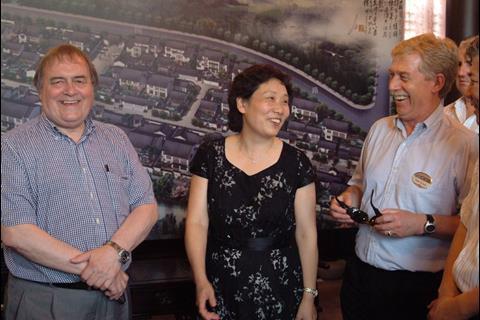
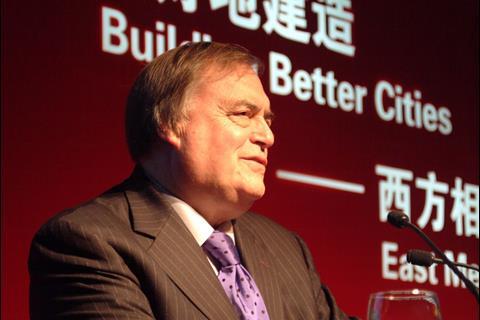
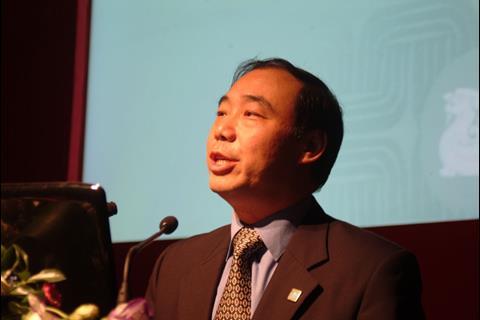
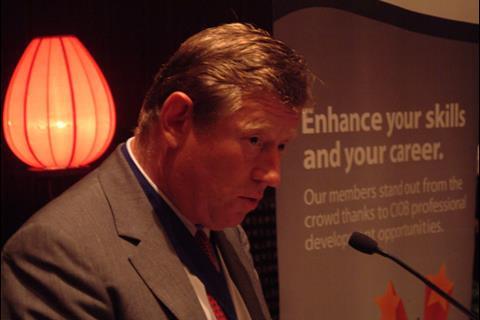
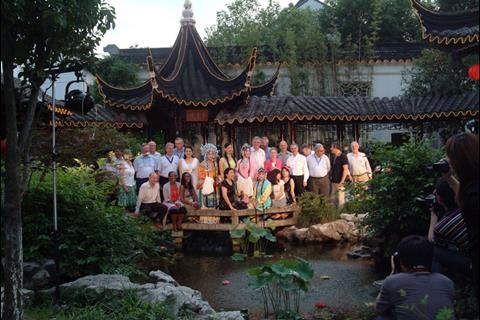
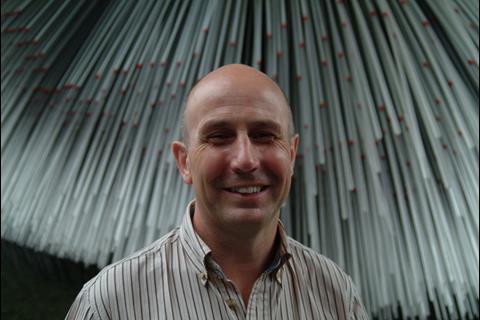

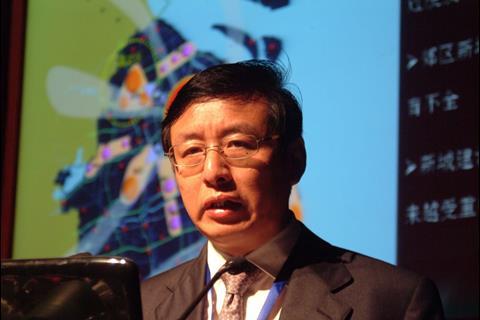
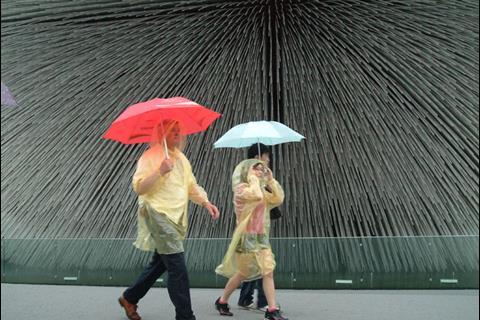
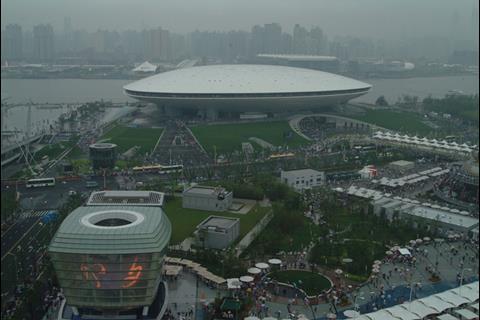






No comments yet